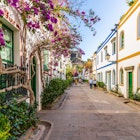

Elegance reigns at Marc Fosh's Simply Fosh. Image by MollySVH / CC BY 2.0
Once ignored in the frantic dash to the coast, Palma has grown into a destination in its own right in recent years, not least because of its burgeoning food scene. With the Med on its doorstep and consistently excellent local produce, restaurateurs and chefs have woken up to the fact that the Mallorcan capital is a city ripe for the gastro picking.

Chefs, for instance, like British expat Marc Fosh (marcfosh.com), who was at the vanguard of the renaissance and whose twinset of restaurants, Simply Fosh and Misa Braseria, pride themselves on simplicity in dishes that show off island flavours as clean and bright as the light that beats down on these streets.
Palma is no one-trick pony when it comes to the serious business of food, and you'll find everything from intimate tapas bars and Asia-meets-Med restaurants to slick lounge-style places with gourmet credentials snuggled down old-town backstreets – most with remarkably pleasing prices.

Market mornings
Dawn rises on another beautiful day and Palma's markets are soon busy with Mallorquíns squeezing fruit for ripeness, sizing up the glistening piles of seafood – some so fresh it's still flapping – and stocking up for the big family lunch.
The real action is at the boisterous Mercat de l'Olivar. There's none of the usual tourist tat sold at other markets and nearly everything is edible – just-caught fish, fruit and veg from the island, plump olives, jamón serrano sliced wafer thin before your eyes, and chorizo with tang and bite. Oyster and tapas bars give hungry shoppers a reason to linger.
A smaller neighbourhood market with much the same produce is Mercat de Santa Catalina.

Sweet treats
Most Mallorquíns like to begin their day sweetly, namely with ensaïmades, light pastry spirals dusted with icing sugar that flake perfectly. Doing a brisk trade since 1910, the Forn del Santo Cristo churns out some of the best, traditionally filled with cabell d'àngel ('angel's hair'), a sweet pumpkin paste, though they also do chocolate, apricot, cream and marzipan versions. This is also the go-to patisserie for cocas de patata (sweet potato buns).
Come afternoon, a sugar craving can only be fixed by a trip to Ca'n Joan de S'Aigo, huddled away in the maze of medieval alleys that fan out from the gothic Eglésia de Santa Eulàlia. Join locals in this antique-filled milk bar dating to 1700, where almond ice cream, spot-on ensaïmades and hot chocolate thick enough to stand a spoon up in are served at marble-topped tables.
Tapas trail
Palma is a sociable, laid-back city and as such it loves its tapas scene. So simple yet brilliant when done right, the tapas here can move from a bite-sized pintxos to fully blown meals. But how to choose from the seemingly never-ending array of tapas bars? Well, a good introduction is the bizarrely named La Ruta Martiana (Martians' Route; rutamartiana.wordpress.com), a bar-cum-tapas crawl every Tuesday and Wednesday evening in the no-go turned boho Sa Gerreria neighbourhood. Around 25 bars have joined forces to serve a pintxo (a tapa skewered on a cocktail stick) with a drink for a bargain €2. The bars are predictably heaving on these nights. Worth seeking out are L'Ambigú and, just around the corner on Carrer de Cordería, Ca La Seu, housed in a 500-year-old former basket-making shop.
For a traditional take on tapas any night of the week, Taberna del Caracol comes up trumps. Atmospherically served below vaults in a gothic basement, the tapas here include the namesake snails.
More imaginative however, are the gutsy tapas served at industro-cool La Taperia (Carrer Montenegro 10, la-taperia.es) in the bar-crammed Santa Catalina neighbourhood. Tapas like Iberian pork in cognac-Dijon sauce have created quite a buzz and the place is packed most nights. You'll find a similarly arty vibe at central Forn de Sant Joan (Carrer Sant Joan 4, forndesantjoan.com), where chefs put interesting twists on tapas, along the lines of oysters with passion fruit caipirinha and zucchini flowers in tempura stuffed with pumpkin and manchego.

New-wave cuisine
The chefs at the helm of Palma's culinary scene seem to be in agreement – keep it market-fresh, unfussy, relaxed and affordable. If the spices are shipped in from overseas, the primary ingredients are nearly always locally sourced and given the chance to shine in signature plates like tender glazed veal cheeks with watercress, peaches and summer truffle risotto at Simply Fosh. Now slick and monochrome, this born-again 17th-century refectory does a cracking three-course lunch for €23.50.
Marc Fosh's second baby, Misa Braseria, is just steps from the Mercat de l'Olivar. Modern rustic is the approach and the flavours are robust. The signature plate is free-range chicken roast to perfection, but the suckling pig with rosemary parmentier, dates and caramelised pine nuts is also a winner. The three-course lunch is a snip at €17.50.
Asian restaurants and sushi bars are popping up in Santa Catalina all the time, but a newcomer that really stands out is Appetite (appetite.es) for its winning combination of informal Aussie charm, cocktails and menu stunners like Thai soft shell crab with mango salad.
Opio at the nouveau-glam Puro Hotel has the designer edge, however, with DJ beats and a kitchen that skilfully blends Mediterranean and Asian flavours in palate-awakening dishes like zingy scallop ceviche with lime, mango and papaya, and baked Iberian pork with pickled mussels and shitake.
Traditional tastes
Mallorca's most memorable traditional dishes whisper of the island's rural interior. More appetising than it sounds, arròs brut ('dirty rice') is a flavour-packed dish of rice, vegetables and meat in a hearty stock. Other classics include tumbet, Mallorca's answer to ratatouille, frit mallorquí, a garlicky lamb offal and vegetable fry-up, and llom amb co, pork loin with cabbage.
Restaurants serving good old-fashioned Mallorcan home cooking are a dying breed in Palma, but there are a few that have stood the test of time, such as high-ceilinged Restaurant Cellar Sa Premsa, with its huge wine barrels and bull-fighting posters.
Buried deep in Palma's oldest quarter, Can Cera Gastro Bar puts a lighter, contemporary touch on predominantly traditional flavours– a superb creamy rice with shellfish might be the prelude for tart Sóller mandarin sorbet, for instance. It ups the romance with its setting, too, housed in a stylishly converted 13th-century town palace and with tables gathered in what has to be one of Palma's loveliest inner courtyards.

Take it home
For a lingering taste of Mallorca, shoehorn your way into the miniscule Colmado Santo Domingo, which looks as though it will collapse under the sheer weight of the jamón serranos and chorizos dangling from its ceiling any minute. This is where you'll also find cheeses from neighbouring Menorca, as well as local honeys, olive oils, fig bread, balsamic vinegar, Es Trenc flor de sal and Sóller marmalade.
Kerry Christiani is the author of the new Mallorca guide. When she's not hiking in the Tramuntana or tapas bar-hopping in Palma, she is busy writing some of Lonely Planet's other European titles. Follow her on Twitter @kerrychristiani.
Explore related stories










